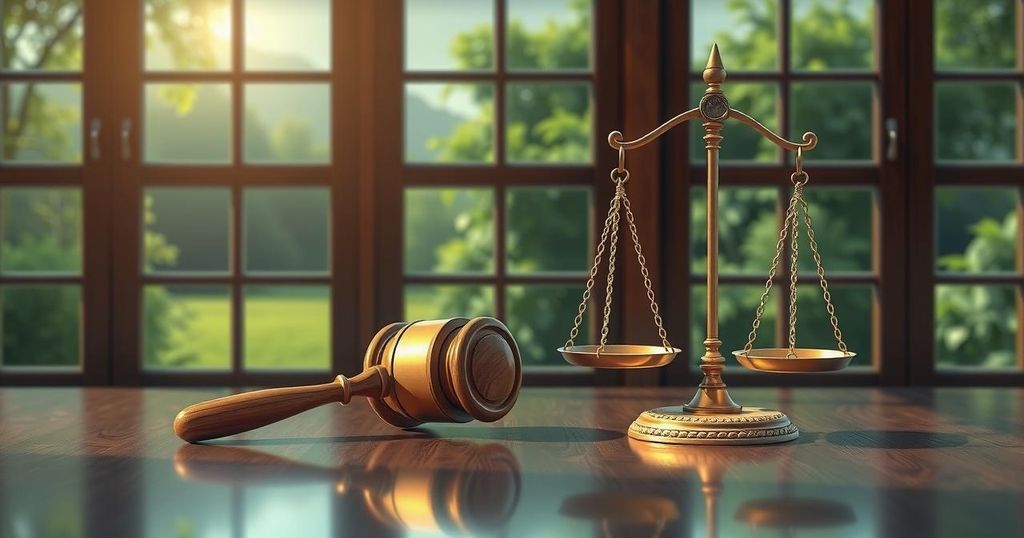Climate change
ANDEAN, ASIA, AZERBAIJAN, BAKU, CLIMATE CHANGE, DONALD TRUMP, ENVIROMENTAL_ISSUES, ENVIRONMENTAL POLICY, EUROPE, GERMANY, GREENHOUSE GAS EMISSIONS, HAMM, MAJORS, PARIS AGREEMENT, REUTERS, RIHAM ALKOUSAA, RWE, SATAT SAMPADA CLIMATE FOUNDATION, SAUL LUCIANO LLIUYA, SEBASTIEN DUYCK, SINGH, U. S
Fatima Khan
0 Comments
Peruvian Farmer Challenges RWE in Landmark Climate Lawsuit
A Peruvian farmer, Saul Luciano Lliuya, continues his landmark climate lawsuit against German energy company RWE in a German court, alleging that its emissions contribute to glacier melting that threatens his home. The outcome could set a precedent for corporate accountability regarding climate change. Lliuya seeks funds for flood defenses, making a broader argument about the responsibility of fossil fuel companies in climate adaptation efforts.
A landmark case is underway in a German court involving a Peruvian farmer, Saul Luciano Lliuya, who claims that the emissions from German energy giant RWE have led to the melting of Andean glaciers. This phenomenon is said to increase the flood risk to his home in Huaraz. The case is particularly significant as it may establish accountability for corporate greenhouse gas emissions and compel companies to contribute to climate adaptation efforts.
Supported by the activist group Germanwatch, Lliuya is seeking approximately 21,000 euros ($23,000) from RWE to assist in financing a $3.5 million flood defense project. Lliuya argues that RWE is responsible for nearly 0.5% of global manmade carbon emissions since the industrial revolution, advocating for the company to cover its proportional share of the damages caused by global warming.
Sebastien Duyck, a senior attorney at the Center for International Environmental Law, highlighted the significance of this case, noting, “Legal experts are watching closely to understand the extent to which this is going … to set a strong precedent.” Discussions on financial contributions from industrialized nations to combat rising sea levels and extreme climate events have been contentious at U.N. climate summits, particularly since the recent political shifts in various countries.
Harjeet Singh from the Satat Sampada Climate Foundation emphasized that cases like Lliuya’s could pave the way for alternative funding strategies aimed at holding responsible companies accountable. He stated, “We can double down on those companies who are responsible for the crisis and how we can raise the proceeds to help people recover from current impacts.”
In response, RWE argues that it should not bear the burden for global warming as a single emitter of carbon dioxide. The company contended that if such liability existed under German law, it could lead to holding every motorist accountable for their emissions.
This case commenced in 2015 in Essen but was initially dismissed; however, the Higher Regional Court of Hamm allowed it to proceed in 2017. The court must assess whether the melting glaciers are significantly raising water levels in Lake Palcacocha and whether they pose a direct risk to Lliuya’s residence. Expert site visits took place in 2022, with findings now awaiting review.
Lukas Arenson, a geotechnical expert, noted that while the focus of the initial report was on ice avalanches, it neglected the potential for rock slides, which could pose significant risks to the region. If the court acknowledges a flooding risk, it will then evaluate the implications of climate change on glacier melting and the associated dangers.
Climate scientist Friederike Otto asserted, “We have a strong causal field, and we have also an attribution paper that shows that the glacier would not have retreated at all without climate change,” emphasizing the scientific basis behind Lliuya’s claims. A study conducted in 2021 corroborated the assertion that human-induced climate change led to glacier melting in the Peruvian Andes.
Finally, Roda Verheyen, Lliuya’s lawyer, expressed that the court’s decision to take up the case was already an achievement, remarking, “Saul … had very little to no hope that this would get anywhere. And now we’re all here.”
The legal proceedings initiated by Saul Luciano Lliuya against RWE represent a pivotal moment in climate litigation, potentially holding corporations accountable for their historical emissions. The case could facilitate significant funding for communities affected by climate change, emphasizing the urgent need for corporate responsibility in global warming mitigation. Legal experts and climate activists view the outcome as critical in shaping future climate justice efforts.
Original Source: kfgo.com




Post Comment